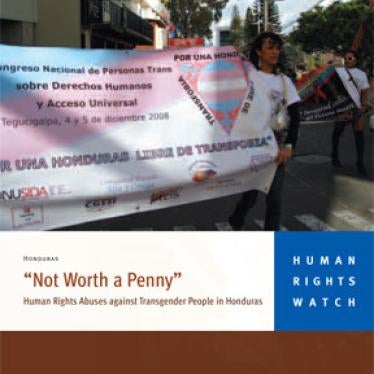(Tegucigalpa) - The Honduran government should ensure a prompt and thorough investigation of the recent murders of transgender women and bring those responsible to justice, Human Rights Watch and Red Lésbica Cattrachas, a Honduran lesbian rights organization, said today. Six transgender women have been murdered in Honduras since November 29, 2010, with the latest killing on January 17, 2011.
The women were murdered on the streets or in their homes in the capital, Tegucigalpa, and in the cities of Comayagüela and San Pedro Sula. The attacks ranged from gunshots to setting the victims on fire.
"The impunity with which these murders have taken place has shaken the entire lesbian, gay, bisexual, and transgender community in Honduras," said Indyra Mendoza, director of Red Lésbica Cattrachas. "We need legislative change and prevention programs to end discrimination in Honduras, because at the moment we are living our lives in hiding."
In its May 2009 report, "Not Worth a Penny: Human Rights Abuses against Transgender People in Honduras," Human Rights Watch detailed the abuse and harassment of the Honduran transgender community and the government's failure to investigate and prosecute bias-motivated attacks on transgender people. Honduras needs a comprehensive anti-discrimination law based on international human rights standards and effective and prompt investigations into all reports of violence against transgender people, Human Rights Watch said in the report.
Since the release of the report, 34 members of the lesbian, gay, bisexual, and transgender (LGBT) community have been murdered in Honduras. But there has only been one successful prosecution and conviction for an attack on a transgender woman.
In the latest series of attacks, the transgender women appeared to have been tortured before being killed. On November 29, 58-year-old Idania Roberta Sevilla Raudales was found dead in her home in Comayagüela, her arms and legs tied with cable cords and knife wounds on her throat.
On December 18, the burned body of 23-year-old Luisa Alvarado Hernández (known as Lorenza in Honduran press reports) was found in a gutter outside her home, also in Comayagüela. She had multiple wounds on her face, as if she had been hit repeatedly with a solid object, local press reports said, and her face was so badly damaged that it was unrecognizable. A used condom was found by her side but there has been no information in the media about whether she had been sexually abused prior to her death.
Five days later, 45-year-old Lady Óscar Martínez Salgado was found stabbed and burned in her Tegucigalpa residence. A family member told the local press that Salgado had previously been assaulted in her home and stabbed in the neck. Following that assault, Martínez Salgado filed a complaint with the National Bureau of Criminal Investigation and identified three of the assailants, who later issued death threats against her. The search for the three suspects is ongoing.
Reana Bustamente, also known as "Cheo", was the last victim of 2010. Her body bearing stab wounds was found on a main street of the capital city on December 29. On January 7, 2011, Briget Makaligton, a transgender sex worker, was found strangled to death in a busy street of Comayagüela, with the dead body of a man presumed to be her client on top of her. The latest known victim was Fergie Alice Ferg, who died from multiple gunshot wounds to the head and chest in the streets of San Pedro Sula, 180 miles northwest of Tegucigalpa.
The International Covenant on Civil and Political Rights (ICCPR), to which Honduras is a party, affirms the equality of all people in articles 2 and 26. The UN Human Rights Committee, which monitors states' compliance with the ICCPR, has held that "sexual orientation" is a status protected under the ICCPR from discrimination. The continuum that exists between "sexual orientation" and "gender identity" has also been noted and touched upon by several UN bodies, as discussed in "Not Worth a Penny."
On May 20, 2010, the Central American Human Rights Council of Prosecutors (Consejo Centroamericano de Procuradores de Derechos Humanos), of which Honduras's national Commissioner of Human Rights Ramón Custodio is a member, expressed its concern at the discrimination faced by the Central American transgender population and asked member states to protect all citizens equally. More recently, the Inter-American Commission of Human Rights expressed its concern about violence against transgender people and called on Honduras to investigate and prosecute those responsible.
These incidents are not isolated. Crime rates in Honduras are among the highest in Central America. According the United Nations Development Program (UNDP) Violence Observatory of the National Autonomous University in Honduras, there were 57.9 homicides per 10,000 inhabitants in 2008. During that year, there were 5.4 homicides per 10,000 inhabitants in the United States.
"The government needs to act urgently to fulfill its obligations under international treaties and swiftly arrest and bring to trial those responsible for these murders," said Dipika Nath, researcher in the LGBT program at Human Rights Watch. "It is up to the government to fulfill its commitment to protect the rights of all Hondurans regardless of their gender identity and sexual orientation."







